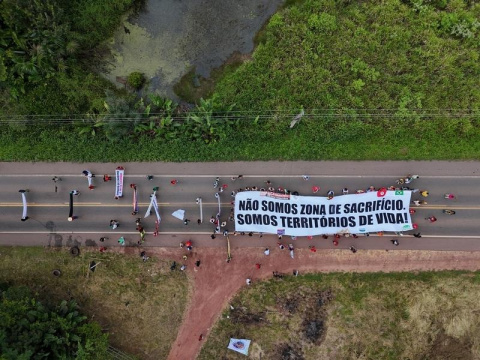Submitted by Veronica Villa on

On October 29, 55 movements and organizations from 14 Latin American and Caribbean countries published a powerful MANIFESTO rejecting carbon markets and defending territories against an avalanche of projects that are causing damage throughout the region. This manifesto challenges COP30 of the UN Framework Convention on Climate Change (UNFCCC), which will begin in the first week of November with high-level meetings.
The groups – mainly representing indigenous peoples, Afro-descendants, peasant communities and fisherfolk – say carbon markets are a false solution to climate change that enable corporations to avoid necessary emission cuts by using the territories of the Global South to generate carbon credits. They point to more than 80 examples of land deals to produce carbon credits with tree plantations, cattle ranches and agricultural crops, covering more than two million hectares in Latin America and the Caribbean, that are already fuelling land grabbing and the destruction of local food systems.
The statement highlights how the promise of high payments for these carbon projects is dividing communities that are vulnerable from a lack of government support and land grabbing by companies for mining, logging and agribusiness.
"Carbon markets are getting more sophisticated and are being regulated into national laws. Corporations toss some crumbs from their massive profits to states in the Global South that have increasingly limited budgets, and these states offer lands—mainly from local villages and communities—to integrate into the global emissions trading schemes. The states present it as public policy but it is really a financialisation of social policy that gives foreign companies access to land," says Larissa Packer of the international organisation GRAIN.
"There are supposed to be consultations with communities – in their own languages – and socio-environmental safeguards for them to sign up to these projects. But many contracts are confidential, and communities do not know about the responsibilities and fines they are on the hook for in the event of fires or deforestation, the risks to their collective rights over their territories, or even that their lands are being used to sanitise the image of polluters and enable the destruction of territories and communities elsewhere,” says Ivonne Yánez of Acción Ecológica, Ecuador.
The groups say the pressure on communities will get worse, with big investors like Saudi Arabia's sovereign wealth fund PIF, Brazilian bank BTG, and technology companies like Microsoft and Amazon, as well as mechanisms such as the Tropical Forest Forever Fund (TFFF), are ploughing huge sums of money into carbon projects in the region, either in partnership with states or directly.
“Carbon markets are a new way for billionaires and corporations to extract more wealth from our territories. They win twice, with permission to expand activities related to fossil fuels and with profits from carbon, water and biodiversity offset markets," says Anderson Amaro, a member of Brazil's Small Farmers' Movement (MPA) and the Latin American Coordination of Peasant Organisations (CLOC-Via Campesina). "We reject this land grabbing for carbon markets and will work together to prevent companies from using our land, water and forests to greenwash their pollution."
The groups say carbon markets are part of a larger carbon colonialism in which war is one of the main contemporary factors deepening the climate, ecological and social crises. They point out that while governments in the Global North spend more and more on their militaries, they refuse to pay up for their historical responsibilities in fuelling the climate crisis and instead propose debt-based climate financing schemes that only profit financial elites.
The signatories call on organisations around the world to support the statement in defence of territories, nature and food sovereignty and against the commodification and financialisation of nature and life.
The statement is available here.
To endorse the statement, click here.
For more information:
• Table of land deals for carbon sequestration projects in Latin America.
• Background documents prepared by GRAIN, WRM and ETC Group. In Portuguese and Spanish only.
Photo: Protest in the Tauá territory - PA 483, against the installation of the agribusiness industrial complex in Barcarena Belém, Brazil, October 2025. Credit: Raoni Figueiredo.
